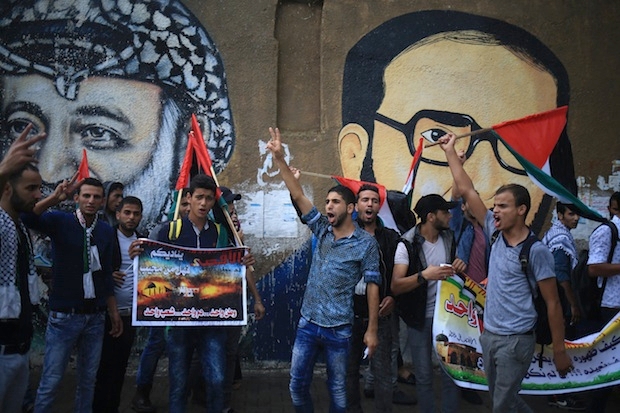In recent days the situation in Jerusalem and the West Bank has been unravelling. For some years now, fighting between Israelis and Palestinians has tended to come in the form of intermittent clashes in and around Gaza. Rocket warfare, Israeli airstrikes and subterranean tunnel attacks have become a familiar part of the latest chapter of this now century long confrontation. In the last couple of weeks, however, the focus of tensions has shifted from Hamas controlled Gaza to the West Bank, where the major Palestinian population centres are under the security control of the somewhat more moderate Fatah.
The violence that we are seeing now is taking the form of roadside shootings, stabbings, rock throwing attacks and rioting. Four Israeli civilians have already been killed over the weekend and several more wounded in similar attempted attacks, while four Palestinians have been killed in riots and clashes with Israeli security forces.
Unsurprisingly, many observers are now asking whether what we are witnessing is the onset of a third Palestinian intifada. The scenes of Palestinians clashing with heavily armed Israeli border police on the edge of dishevelled West Bank villages, or recent incidents such as the gunning down of an Israeli couple in front of their four children while they drove along a deserted road at night are all too reminiscent of two previous intifadas. Another intifada is precisely what the militant group Islamic Jihad has now promised to unleash.
For his part, Palestinian President Abbas is keeping up co-operation between his security forces and the Israeli military, a move that is certainly in his own interest. After all, Abbas’s democratic mandate expired back in January 2009 and there is every reason to believe that a full blown Palestinian uprising would sweep him and his cronies from what power they have.
But though Abbas may now be co-operating with efforts to quell the violence, there is no getting away from the fact that this outburst of unrest coincides with his own inflammatory signalling at the UN General Assembly.
During his address last week the Palestinian President announced before the world that the Palestinians are no longer bound by the terms of the Oslo peace agreement. This would certainly be big news if anyone believed for a moment that Abbas would actually follow through on it. In reality, Abbas is forever announcing that he will resign, end security co-operation with the Israelis or even dissolve the Palestinian Authority altogether. As such, this supposedly grave and grandiose declaration received scant news coverage. The New York Times used it as an opportunity to dismiss Abbas as an ‘acutely bitter man’ who has ‘given up on peace.’
But in light of the recent outbreak of violence, observers should have taken Abbas’ speech more seriously. The really significant part of his UN address had nothing to do with dissolving the Oslo peace process. After all, Palestinians can clearly see that Abbas has little interest in taking any measures that could jeopardize his flow of international funding.
No, the really significant part of Abbas’ UN address came when the Palestinian President took the opportunity to endorse a conspiratorial and evidently baseless allegation that has always been guaranteed to rouse Palestinian society into a violent frenzy. It is the fantasy that the Jewish state is poised to make a move against Al-Aqsa Mosque in Jerusalem. Indeed, in his speech Abbas specifically accused the Israeli government of seeking to ‘convert the conflict from a political to religious one’. But of course by repeating such explosive notions, the Palestinian President was ensuring precisely such a transition in the minds of his people.
By choosing to reference Al-Aqsa, Abbas knew perfectly well what he was doing. In the days prior to that speech there had been a sharp rise in tensions around Jerusalem’s Temple Mount compound, where both the al-Aqsa mosque and the Dome of the Rock sit.
Israeli authorities have always protected the rights of those of other faiths —including Jews — to visit the compound, although not to worship there. In recent months, however, there has been growing incitement on this issue, with the Palestinian public being fed the line that the presence of Jews among non-Muslim visitors to the compound represents an attempt to jeopardise the mosques there. That was precisely what Abbas encouraged his people to believe when he used the podium of the UN General Assembly to claim that the Israeli government has a scheme to ‘undermine’ Jerusalem’s Islamic sanctuaries.
Even when not under the international scrutiny that comes with speaking from the UN assembly chamber, Abbas can be still fiery on this subject. Having long denied that Jews have any kind of historical or religious connection to Jerusalem’s religious compound, Abbas spoke in September of how Jews have ‘no right to desecrate the mosque with their dirty feet’ and referring to the riots taking place at Al-Aqsa proclaimed that ‘Every drop of blood spilled in Jerusalem is pure, every martyr will reach paradise, and every injured person will be rewarded by God’.
But still, Abbas would have us believe that it is the Israeli government that seeks to turn this into a religious conflict?
Now that the violence in the West Bank and Jerusalem is gaining pace it is notable that far from dissolving the Oslo agreements, the Palestinian Authority is eagerly maintaining security co-operation with Israel. It is impossible to know where this latest escalation may lead – but Abbas must be aware that if the turmoil he has helped unleash gets out of hand, it could take him too.
Tom Wilson is Resident Associate Fellow at the Centre for the New Middle East at The Henry Jackson Society






Comments